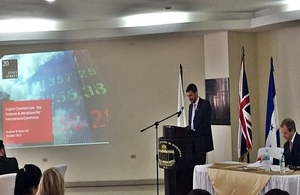British Embassy trains Honduran lawyers on English Law to improve business environment and boost commercial links with the UK
The British Embassy financed a one day seminar aimed at understanding the benefits of using English law in arbitration processes that could lead to a swift resolution of dispute cases and boost commercial links with UK companies interested in doing business with Honduras.

Arbitration Seminar Honduras
The training was delivered by 20 Essex Street, a leading and long-established set of commercial barristers’ chambers based in England and Singapore. Their work is essentially concerned with international disputes between, and providing legal advice for, companies and businesses and for state and public authorities. The activity was also promoted by the Honduran College of Lawyers (CAH).
As one of the major European legal systems, Roman law being the other, English law has spread to many other countries, including the USA, Canada, Australia and New Zealand. To date English law is preferred amongst businesses and states to resolve disputes, especially when cases can languish in local courts. Countries that also practice English law score highest in rankings that evaluate the business environment.
Counsellors Andrew Baker, Thomas Raphael, Penelope Neville and Monica Feria-Tinta, talked on a series of issues from the attractions of English law for international commerce, how to plan international arbitration processes, to human rights in investment arbitration. The barristers also met with Honduran authorities interested in developing further the concept of “Zones for Employment and Economic Development” (ZEDEs).
The course was attended by representatives of the association of lawyers, students of law, members from other diplomatic missions, law firms, and magistrates and judges from the judicial system.
To mark this project, Carolyn Davidson, British Ambassador to Honduras, said:
“This is an excellent opportunity to understand the role English law plays in the world of businesses and trade and in a context where Central American countries are increasingly entering into international investment agreements and where transactions in key areas such as energy are becoming more relevant. This understanding will also be greatly appreciated by UK companies interested in doing business with the region”.